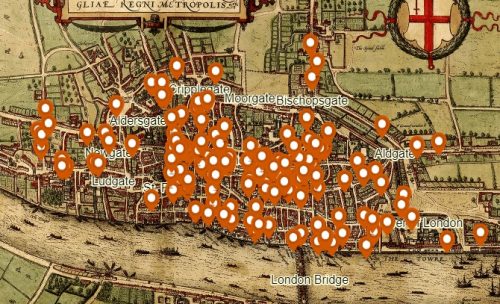 More than 60 Chess pieces carved from wood and bone during the 17th century have been found during excavations at Berezovo in norhtern Siberia. Eight fashioned from fossil ivory were exhibited at the most recent Women’s World Chess Championship.
More than 60 Chess pieces carved from wood and bone during the 17th century have been found during excavations at Berezovo in norhtern Siberia. Eight fashioned from fossil ivory were exhibited at the most recent Women’s World Chess Championship.
Archaeologists excavating a pottery workshop in Israel dating back 1,800 years found that the facility had recreational facilities for workers, including a spa and game room. Inside the game room were four game boards similar to Backgammon or Mancala.
A dot pattern carved in to a 4,000 year-old rock shelter in Azerbaijan was determined to be an example of a game known as 58 Holes, or Hounds and Jackals, another precursor to Backgammon. Previously found examples of the game from that period were limited to Mesopotamia, Egypt, and the Near-East.
Professor Manuel Eisner, with the Violence Research Centre at the University of Cambridge, studied 700 year-old coroner’s records to produce a map of murders in 14th century London. Among his discoveries:
Like in modern societies, homicide was most likely at weekends. Almost a third of all cases (44) occurred on Sundays. Sunday was the day when people had the time to engage in social activities – drinking and playing games that would occasionally trigger frictions leading to assault.
For example:
- In March 1301, an argument that resulted when three men interrupted a Chequers game being played by two others, ended with one of the interrupting men forcibly stripping one of the players of his clothes and stabbing the other in the chest with a dagger.
- In November 1321, two men got in to an argument playing the dice game Hazard inside a brewery. Outside after the game, one attacked the other with a sword then ran away and took refuge in a church. Sometime in the following week he escaped and was never caught by authorities.
- In December 1323, a tavern-keeper was stabbed by a customer that he had beaten in a game of Backgammon.

- Comments Off on Gamer Archaeology
Trending
- Massdrop.com
- Oh the Irony—Illuminati Card Game Continues to Inspire Conspiracy Theorists
- Home
- Footprints, an Educational Ecology Game
- USPS Adds Board Game Flat Rate Box
- Baila, the Estonian Drinking Card Game
- Crystal Caste Wins Dice Patent Suit Against Hasbro
- Mirror Game, Red and Blue
- Are Board Games Dangerous?
- The Truth About Dominoes On Sunday in Alabama
Archives
Most Popular Articles
- Oh the Irony—Illuminati Card Game Continues to Inspire Conspiracy Theorists
- The 20 Most Valuable Vintage Board Games
- The Truth About Dominoes On Sunday in Alabama
- Sequence Game, and Variants
- USPS Adds Board Game Flat Rate Box
- Baila, the Estonian Drinking Card Game
- The 13 Most Popular Dice Games
- Are Board Games Dangerous?
- Guess Who? The Naked Version
- What Happened to the Jewel Royale Chess Set?
Recent Posts
- Toy Fair 2019—Breaking Games
- Talisman Kingdom Hearts Edition
- Toy Fair 2019—Winning Moves
- Toy Fair 2019—Games Workshop
- Toy Fair 2019—Star Wars Lightsaber Academy
- Toy Fair 2019—Stranger Things Games
- Toy Fair 2019—HABA
- Licensing Roundup
- Game Bandit
- 2018 A Difficult Year For Hasbro But Not For D&D Or MtG
Recent Comments
- on Toy Fair 2019—Winning Moves
- on Game Bandit
- on Second Look—Dungeons & Dragons Waterdeep Dragon Heist
- on Crowdfunding Highlights
- on Beyblade SlingShock
- on Game Bandit
- on Game Bandit
- on Watch This Game!, the Board Game Review Board Game
- on Second Look—Vampire: The Masquerade 5th Edition
- on Palladium Books Loses Robotech IP License, Cancels Five-Year-Overdue Robotech RPG Tactics Kickstarter




